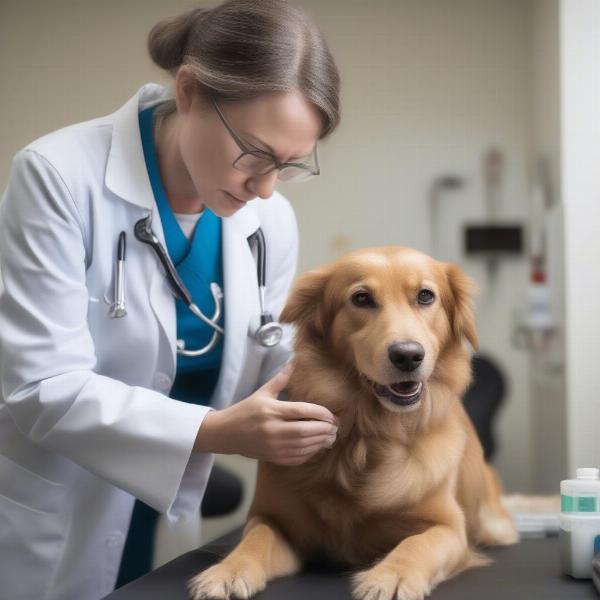If your furry friend is exhibiting dog panting at night and restlessness, you’re understandably concerned. This behavior can stem from various reasons, ranging from simple discomfort to more serious underlying health issues. Understanding the potential causes is crucial to addressing the problem effectively and ensuring your dog’s well-being. This article will explore the common reasons for nighttime panting and restlessness in dogs, offering practical advice and solutions to help your canine companion sleep soundly.
Why is My Dog Panting and Restless at Night?
Several factors can contribute to a dog’s nighttime panting and restlessness. Identifying the specific cause is the first step towards finding a solution. Let’s delve into some of the most common culprits:
-
Temperature: Overheating is a frequent cause. If your home is too warm, or your dog’s bedding is too thick, they may struggle to regulate their body temperature, leading to panting and restlessness. Ensuring a cool, comfortable sleeping environment is essential.
-
Anxiety: Just like humans, dogs can experience anxiety, which can manifest as panting, pacing, and difficulty settling down at night. Separation anxiety, noise phobias, or changes in routine can trigger anxiety-related restlessness.
-
Pain or Discomfort: Underlying medical conditions, such as arthritis, injuries, or infections, can cause pain and discomfort, leading to restless nights and excessive panting. If you suspect your dog is in pain, consult a veterinarian promptly.
-
Cognitive Dysfunction Syndrome (CDS): In older dogs, CDS, similar to dementia in humans, can disrupt sleep patterns and cause confusion and anxiety, resulting in panting and restlessness.
-
Medications: Certain medications can have side effects that include panting and restlessness. If your dog recently started a new medication, discuss potential side effects with your veterinarian.
How to Help a Restless, Panting Dog at Night
Once you’ve identified the potential cause of your dog’s nighttime discomfort, you can implement appropriate solutions:
-
Create a Cool Sleeping Environment: Ensure your dog’s sleeping area is well-ventilated and at a comfortable temperature. Consider a cooling mat or fan, especially during warmer months.
-
Establish a Bedtime Routine: A consistent bedtime routine can help alleviate anxiety and promote relaxation. This could include a calming walk, a gentle massage, or quiet playtime before bed.
-
Provide a Comfortable Bed: A supportive and comfortable bed can make a world of difference for a restless dog. Choose a bed that suits your dog’s size, age, and sleeping style.
-
Address Anxiety: If anxiety is the culprit, consider pheromone diffusers, calming supplements, or behavioral modification techniques. Consult a veterinarian or a certified dog trainer for guidance.
-
Manage Pain: If you suspect your dog is experiencing pain, seek veterinary care. Pain management strategies, such as medication or physical therapy, can significantly improve your dog’s comfort and sleep quality.
When to Consult a Veterinarian
While some causes of nighttime panting and restlessness can be addressed at home, others require professional veterinary attention. Consult your veterinarian if:
- Your dog’s panting and restlessness are sudden or severe.
- Your dog exhibits other symptoms, such as loss of appetite, lethargy, or changes in behavior.
- Your dog’s panting and restlessness persist despite implementing home remedies.
- You suspect your dog is experiencing pain or discomfort.
 Veterinarian Examining a Dog
Veterinarian Examining a Dog
Is My Elderly Dog Panting at Night Due to Old Age?
Senior dogs are more prone to conditions that can cause nighttime panting and restlessness, such as arthritis, cognitive dysfunction, and heart problems. It’s crucial to consult a veterinarian to determine the underlying cause and develop an appropriate treatment plan. elderly dog panting at night
Could My Dog’s Panting Be Related to the Temperature in Their House?
Absolutely! Dogs can easily overheat, especially at night if their sleeping area is too warm. Make sure their environment is cool and well-ventilated. heated light for dog house
Conclusion
Dog panting at night and restlessness can be distressing for both you and your furry companion. By understanding the potential causes and implementing the appropriate solutions, you can help your dog enjoy peaceful, restful nights. Remember to consult a veterinarian if the problem persists or if you suspect a more serious underlying issue. dog panting at night
FAQ
- Why does my dog pant so much at night? Several reasons, including overheating, anxiety, pain, or underlying medical conditions. why does my dog pant so much at night
- Is it normal for dogs to pant a little at night? Some panting can be normal, especially if it’s warm. However, excessive or persistent panting warrants investigation.
- What can I do if my dog is panting and restless in the middle of the night? Check their temperature, offer water, and ensure their sleeping area is cool and comfortable. dog panting in middle of night
- When should I be concerned about my dog panting at night? If it’s excessive, accompanied by other symptoms, or persists despite home remedies.
- Can anxiety cause a dog to pant and pace at night? Yes, anxiety is a common cause of nighttime restlessness and panting in dogs.
- What are some signs my dog is in pain? Restlessness, panting, changes in behavior, loss of appetite, and vocalization.
- How can I make my dog’s sleeping area more comfortable? Provide a supportive bed, ensure a cool temperature, and minimize noise and distractions.
ILM Dog is your trusted resource for expert advice and guidance on all aspects of dog care, from breed selection and health to training, nutrition, and grooming. We are dedicated to providing practical and reliable information to help you nurture the well-being of your canine companion. We specialize in providing tailored advice to dog owners worldwide, taking into consideration diverse cultural backgrounds and experience levels. Whether you’re a seasoned dog owner or just starting your journey, ILM Dog offers valuable insights to enhance the bond with your furry friend. Contact us today for personalized support: [email protected] or +44 20-3965-8624. ILM Dog is here to help you every step of the way.